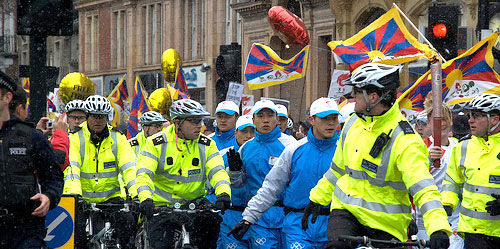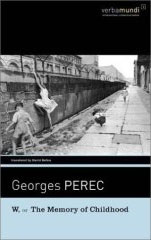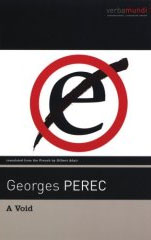
George Perec’s W, and the tyranny of the Olympic Ideal, by James Bridle.
The Frenchman Pierre Frédy, Baron de Coubertin, founder of the modern Olympics, believed that the Olympic games could be a force for peace in the world, creating a new religion “adhering to an ideal of a higher life, to strive for perfection”, as well an an elite “whose origins are completely egalitarian”. But they had a darker, parallel root: Coubertin had seen his nation humiliated in the Franco-Prussian war of 1870-71 and blamed its failure on the dissoluteness of its youth. Only through strenuous physical exercise could the fortunes of the state and the cult of the victor be restored.
This tension has long manifested itself in the Games themselves, a time-honoured venue for controversy, international point-scoring and revenge. Following Hitler’s politicisation of the games in 1936, the first boycotts occurred in 1956, in response to the twin crises of Suez and Hungary. More followed in 1972 and 1976, as African nations protested the racist systems of Rhodesia and South Africa, and most famously in 1980 and 1984 as the Cold War giants took turns to snub each other at the starting line.
The Black September action in Munich, 1976, is the most famous attack on the Olympic ideal, but to this day Iranian athletes are forbidden to compete against those from Israel, while periodic wranglings between China and Taiwan have seen both restrict their presence at the games. And all this without the ongoing doping scandals (although it should be noted that the first doping disqualification in Olympic history was for the use of alcohol: the Swede, Hans-Gunnar Liljenwall, whose “two beers” to calm his nerves before the 1968 pentathlon led to the wholesale exclusion of the Swedish men’s team).
Coubertin himself believed that art was an essential component of the Olympic ideal: “In the heyday of Olympia the glory of the Olympic Games consisted of a harmonious blending of arts and sports. So it should be once again in the future.” From 1912 to 1948 artists too could compete in the games, receiving medals for submissions in the categories of architecture, literature, painting, sculpture, and music (the latter, somewhat bizarrely, only submitted on paper) – providing the artworks themselves were inspired by sport.

It is difficult to argue that Georges Perec’s 1975 novel, W, or The Memory of Childhood, is inspired by sport; however, it takes as its central image the resonant Games: the Games themselves (including the Spartakiads, held first by the Soviet Union in opposition to the ‘bourgeois’ Olympics, and later as a companion, wholly communist competition); the Olympic villages; the striation of society into organisers, the corps of judges and referees, the body of the athletes and the mere spectators; and the succession of trials, heats and finals that lead to that most exclusive of platforms: the podium.
W is a dual narrative, an evocation of the writer’s childhood and a description of the island of W, somewhere in the South Pacific, in the inhospitable reaches of Tierra del Fuego. On W, obscure of origin but “almost exclusively Aryan” in population, “Sport is king.”
The active inhabitants of W – that is, the sportsmen, and the trainers, managers, dieticians and so on necessary to their endeavours – are concentrated in four villages which compete against one another according to a fixed schedule, culminating in annual Olympiads at which the fate of the villages – their reputations, their food supplies, even the names of the inhabitants, are decided. More regular trials are held within the villages, and less vicious but no less significant championships are contested between neighbouring villages.
Perec worked for many years as an archivist in the Neurophysiological Research Laboratory attached to the Hôpital Saint-Antoine in Paris. The daily drudgery of his work, the handling of vast tracts of data, charts and figures, infected his writing. His most famous novel, Life: A User’s Manual, is filled with the minutiae of lists, inventories and accounts: the classification of life into comprehensible, actionable cells. (It ends too, with another occurrence of the inscrutable ‘W’.) In the obsessive training, timing and ranking of the Olympic athletes, and the consequent exclusion of the weak, lame and just not good enough, he saw the racial categorisations, the skull measurements and train timetables, that underpinned the great tragedy of his life and of the twentieth century.

At the start of W, the writer notes: “I have no childhood memories. Up to my twelfth year or thereabouts, my story comes to barely a couple of lines: I lost my father at four, my mother at six; I spent the war at Villard-de-Lans. In 1945, my father’s sister and her husband adopted me.” Perec’s father Judko Peretz, an emigrant from Poland, was killed fighting for France in 1940. His mother Cyrla perished in Auschwitz.
W remains an abstraction, and untellable. It is a tale told by a child narrator, with only occasional interjections from an elder, and those serve only to remind us that such recollections are at best fragmentary, and flawed. What remains is an outline – of a coastline, of a political system, of a series of events that together add up to an obliteration. In La disparition (translated into English as A Void) Perec writes an entire novel without the letter ‘e’: this omission provides the block on which his characters stumble and lose themselves, forever aware that history is only experiential, it can not be retold.
War itself provides the narrative that obliterates the individual experience. As the athletes of W are subsumed in the Olympian ideal, so the victims of war, both direct and indirect, lose not only their lives but their names and histories. W is a challenge to the past to see the Holocaust as it occurred; and a challenge to us to see through the murderous rhetoric and actions of our own time. In W, everyone is complicit.
This essay was originally published in The Idler, Issue 41, available now from all good bookshops. Photograph of the Olympic Torch procession through London courtesy of stemy, via Creative Commons.
Comments are closed. Feel free to email if you have something to say, or leave a trackback from your own site.